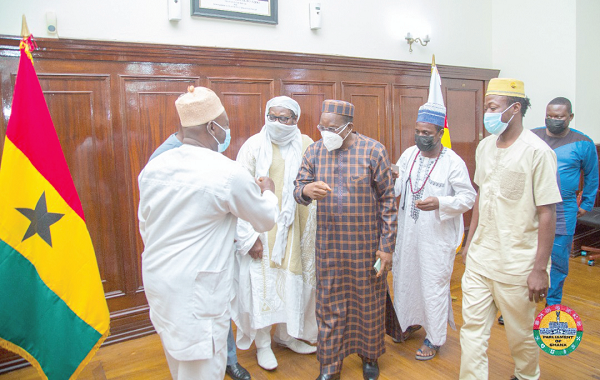The Speaker of Parliament, Mr Alban S.K. Bagbin, has emphasised the need for Africa to embrace and promote its cultural identity, including indigenous languages, to propel the social and economic development of the continent.
He said African countries, including Ghana, must chart a new path to growth centred around Africa’s cultural identity because none of the developed countries relied on foreign cultures to attain their current status.
According to Mr Bagbin, Africa lagged behind in development because African countries had, over the years, followed the ideas and value systems of other cultures that did not conform to Africa’s way of life.
He was speaking during a call on him by the leadership of the Tijaniya Muslim Council of Ghana, led by Sheik Muhammed Mutawakil Iddris, at Parliament House in Accra.
Tijaniya is a form of the Sufi movement of the teachings of Sidi Ahmad al Tijani in North Africa but now increasingly prevalent in West Africa, predominantly in Senegal, The Gambia, Mauritania, Mali, Guinea, Niger, Chad, The Sudan and Northern Nigeria.
Its devotees are called Tijaniya.
The delegation was in Parliament to, among other things, discuss issues of mutual cooperation and also congratulate Mr Bagbin on his elevation to the high office of Speaker of Parliament.
Western benchmark
The Speaker urged Africans to avoid the tendency of using the benchmark of the Western world as measurement of Africa’s level of development.
That tendency, he said, had contributed to the under-development of the continent because it was not realistic or progressive.
"The poverty in Africa is not the poverty of wealth or property but rather the poverty of the mind," Mr Bagbin added.
He called for a more radical approach to the growth of the continent by working towards swaying the minds of the people, particularly the youth, to embrace and promote their own culture and identity.
The youth, Mr Bagbin noted, were often tagged as being impatient, emotional and prone to violence because of borrowed cultures and systems, adding: "We must see a paradigm shift."
Gratitude
Sheik Iddris expressed gratitude to the Speaker for the support he had offered the council over the years.
He appealed for more assistance for the initiatives and programmes of the council, including agriculture, education and youth empowerment.

